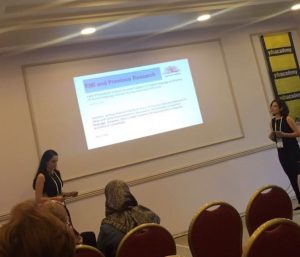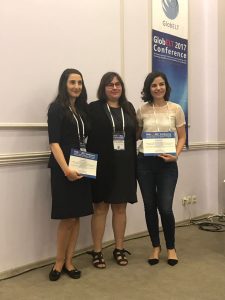Reflection on GlobELT 2017
Conference Title: GlobELT Conference 2017
Presentation Title 1: Investigating the perceived factors affecting students’ level of English proficiency during their studies in a university with English-medium instruction: a phenomenological study
Presentation Title 2: The impact of English medium instruction (EMI) on students’ language abilities
Presenters: Gülçin Coşgun, Bahar Hasırcı
1.Brief information about the conference
Researchers, linguists, EFL/ESL experts and ELT scholars had the opportunity to present their papers at the GlobELT 2017: An International Conference on Teaching and Learning English as an Additional Language, which was held in Ephesus, İzmir between 18-22 May. The major themes in the conference were:
Applied Linguistics and Language Education
Approaches and Methods in English Education
Culture and Literature in English Education
Early English Education
English as an International Language
English for Academic Purposes
English for Specific Purposes
English Language Curriculum and Teaching Materials
Intercultural Communication
Language and Peace Education
Language Learning and Acquisition
Language Policy
Language Testing and Evaluation
Life-long Language Learning
Distance Language Education
Multimedia and ICT in English Education
Teacher Training and Education
Translation Studies & Language Teaching
The key note speakers were Brian North (British Council), Hacer Hande Uysal (Gazi University), Alastair Henry (University West) and Steve Mann (University of Warwick).
2. Brief information about our presentations:
We submitted and presented two papers at the conference.
Abstract of our first presentation:

Being a global lingua franca, English is increasingly recognized as an indispensable requirement in various fields including business, diplomacy, and academics, which led to an increase in the number universities providing English-medium instruction (EMI). Due to the popularity of the EMI programmes, there have been much qualitative research investigating the reasons, advantages, challenges of EMI and the needs of the students and instructors (Coleman, 2006; Kırkgoz, 2009; Kim 2002). However, there is a lack of empirical research on the actual language gain during the course of students’ studies (Hu and Lei, 2014). Therefore, this paper aims to investigate English-medium university students’ perceptions of the change in their language ability and provide statistical evidence for the difference between students’ level of English proficiency when they start their departmental studies and in their 4th semester and onwards based on their proficiency exam scores. The research has a quantitative approach including a questionnaire to explore students’ perceptions the change in their language competence and a comparison of exam results of these students. Results revealed that 1) studying in an English-medium university improves students’ reading, listening and overall English proficiency significantly 2) there is not a statistically significant change between student’s pre and post writing scores 3) the empirical findings are line with participants’ perceptions of the impact of studying in an English-medium university on their language development. These findings suggest insightful implications for English-medium universities in Turkey and all around the world.
Abstract of our 2nd presentation:

There has been a significant increase in the number of students studying in a university which provides English-medium instruction (EMI); therefore, it has become important to explore the growing trend at universities. There have been some studies focusing on the reasons for the popularity of EMI and the challenges associated with this phenomenon (Hellejaer &Westergaard, 2003; Klaassen & Graaff, 2001; Kim, Tatar & Choi, 2014). However, there are not many studies on students’ perceptions regarding the language development in an EMI context Therefore, this paper aims at investigating Turkish English-medium university students’ perceptions of the change in their language ability and the factors affecting this change. This study undertakes a phenomenological approach and multiple interviews with different participants sharing similar experiences were conducted for an in-depth investigation of experiences and perceptions of undergraduate students on their language development in EMI context. Results revealed that 1) when students are highly exposed to English and are expected to use it productively for their studies, they perceive that there is greater development in their language skills and abilities 2) students think that corrective feedback plays a crucial role in helping them focus their attention on the form 3) speaking is perceived to be the weakest and the least improved skill over the years. These findings suggest insightful implications for English-medium universities in Turkey and all around the world.
3. Highlights from Conference
It was a very big event bringing together scholars, researchers, academicians and teachers teaching various contexts and covering a wide range of subjects from teacher education, linguistics, assessment to classroom practice. We had the opportunity to listen to local and foreign colleagues presenting their papers. We also had the opportunity to discuss and exchange ideas as well as expanding our network with very valuable scholars. One of the plenary sessions was conducted by Hacer Hande Uysal from Gazi University. We found what she suggested regarding critical pragmatic approach to academic writing interesting. She described pragmatic and critical approach. She then introduced critical pragmatic approach as the best approach so as to teach academic writing skills. Critical pedagogical approaches involve awareness raising about the complexities and socio-political issues surrounding English academic writing and code-mixing with L1, which leads to rhetorical creativity. The presentation also included the discussion about the advantages and disadvantages of this new approach.

Leave a Reply